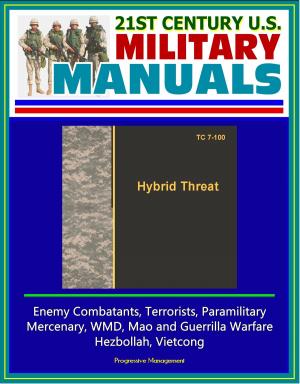The First United States Army Observers of Military Conflicts in Post Napoleonic Europe (1855-1871) - Delafield Commission to the Crimean War and Sheridan Expedition to the Franco-Prussian War
Nonfiction, History, Western Europe, Military, Strategy| Author: | Progressive Management | ISBN: | 9780463035290 |
| Publisher: | Progressive Management | Publication: | May 12, 2018 |
| Imprint: | Smashwords Edition | Language: | English |
| Author: | Progressive Management |
| ISBN: | 9780463035290 |
| Publisher: | Progressive Management |
| Publication: | May 12, 2018 |
| Imprint: | Smashwords Edition |
| Language: | English |
This excellent report has been professionally converted for accurate flowing-text e-book format reproduction.
During the period of 1855-1871, the United States Army commissioned two formal observations of foreign conflict: the Delafield commission to the Crimean War and the Sheridan expedition to the Franco-Prussian War. The first U.S. Army observers of foreign military conflict, both groups were poised to improve the Army much by observing the great military contemporaries of their time. Several observations and recommendations would bear fruit for the U.S. Army; however, many seemingly simple observations and recommendations were not made by the commission. The Delafield commission and Sheridan expedition to Europe were appropriate and deliberate strides towards the professionalization of the United States Army. Their influence on the Army is discussed in the details of this report.
Why did the observations of the Delafield commission to the Crimea War (1855-1856) and Lieutenant General Sheridan's expedition to the Franco-Prussian War (1870-1871) have little to no influence on the United States Army?
The second chapter of this thesis is devoted to the Delafield commission to the Crimea with a detailed discussion of its membership and the results of their touring of various militaries of Europe. The second chapter will conclude with the findings and recommendations of the commission and will resolve more specific questions in regards to the Delafield commission: what were the goals of the Delafield commission to Crimea? What specific recommendations were made by the Delafield commission to the United States Army? Were any of these recommendations followed by the United States Army? The third chapter is focused on the Sheridan expedition to the Franco-Prussian War in 1870. The chapter will discuss the details of the expedition and the observations made by Sheridan. Similar to the second chapter, this work will attempt to answer the specific questions of Sheridan's expedition: what were the goals of Sheridan's expedition to the Franco-Prussian War? What recommendations were made by Sheridan's expedition to the United States Army? Were any of the recommendations made by Sheridan followed by the United States Army?
The fourth and final chapter of this thesis is dedicated to compare and contrast the two expeditions in an effort to better understand why these two expeditions poised to achieve so much have remained relatively forgotten. The work will include the primary lessons learned by studying the example of the Delafield commission and Sheridan's expedition to the Franco-Prussian War. In closing, this chapter will recommend other possibilities for further research for those wanting to continue the comparison of the expeditions.
This excellent report has been professionally converted for accurate flowing-text e-book format reproduction.
During the period of 1855-1871, the United States Army commissioned two formal observations of foreign conflict: the Delafield commission to the Crimean War and the Sheridan expedition to the Franco-Prussian War. The first U.S. Army observers of foreign military conflict, both groups were poised to improve the Army much by observing the great military contemporaries of their time. Several observations and recommendations would bear fruit for the U.S. Army; however, many seemingly simple observations and recommendations were not made by the commission. The Delafield commission and Sheridan expedition to Europe were appropriate and deliberate strides towards the professionalization of the United States Army. Their influence on the Army is discussed in the details of this report.
Why did the observations of the Delafield commission to the Crimea War (1855-1856) and Lieutenant General Sheridan's expedition to the Franco-Prussian War (1870-1871) have little to no influence on the United States Army?
The second chapter of this thesis is devoted to the Delafield commission to the Crimea with a detailed discussion of its membership and the results of their touring of various militaries of Europe. The second chapter will conclude with the findings and recommendations of the commission and will resolve more specific questions in regards to the Delafield commission: what were the goals of the Delafield commission to Crimea? What specific recommendations were made by the Delafield commission to the United States Army? Were any of these recommendations followed by the United States Army? The third chapter is focused on the Sheridan expedition to the Franco-Prussian War in 1870. The chapter will discuss the details of the expedition and the observations made by Sheridan. Similar to the second chapter, this work will attempt to answer the specific questions of Sheridan's expedition: what were the goals of Sheridan's expedition to the Franco-Prussian War? What recommendations were made by Sheridan's expedition to the United States Army? Were any of the recommendations made by Sheridan followed by the United States Army?
The fourth and final chapter of this thesis is dedicated to compare and contrast the two expeditions in an effort to better understand why these two expeditions poised to achieve so much have remained relatively forgotten. The work will include the primary lessons learned by studying the example of the Delafield commission and Sheridan's expedition to the Franco-Prussian War. In closing, this chapter will recommend other possibilities for further research for those wanting to continue the comparison of the expeditions.















